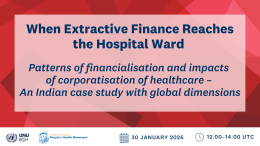The FAST annual stakeholder convening gathers the financial sector to share knowledge and practices that help progress the aim to eradicate modern slavery, including human trafficking. We bring together public and private sector experts on regional and global contexts, civil society, research communities and, most significantly, people with lived experience (survivors). This year, the convening proposes to explore the theme of increasing opportunities to apply ESG (environmental, social and governance) principles in financial sector actions to end modern slavery in value chains.
The goal of the convening is threefold:
1. To spotlight opportunities for the financial sector to address modern slavery and human trafficking (MSHT) through ESG and human rights due diligence frameworks;
2. To share global examples and best practices; and
3. To develop a roadmap on potential partnerships, information networks, and/or resources with and for the diverse financial sector actors.
Convening Theme
Applying effective governance and addressing the nexus of environmental and social risk to end modern slavery is one of the priority themes identified by FAST for its next phase of work (FAST 3). The environmental and social impacts of business are intimately linked. There are high risks of forced labour in extractive industries, fishing, construction, and other environmentally damaging activities such as deforestation. Further, environmental degradation and climate change increase community vulnerability to modern slavery through exposure to resource scarcity, conflict, and displacement.
This convening will create opportunities to connect social and environmental impacts for the financial sector and strengthen implementation of ESG goals and human rights due diligence (HRDD) standards. Topics will include how investors can accelerate change, the potential of applying ESG goals to go beyond risk management and prevent harm to people and the planet, the role of public-private partnerships in achieving good governance, and the impact of financial sector regulation.
Visit the FAST initiative project page here and access publications and resources that reflect issues to be discussed at the Convening.
Session Descriptions
Opening Session: The ESG Landscape Today and Tomorrow: What Does This Mean for Anti-Slavery Action?
FAST research and work have identified areas where the financial sector, in partnership with other stakeholders, can approach ESG holistically to understand and mitigate risk and achieve positive environmental, social and governance outcomes. We will discuss the current ESG landscape, how it continues to evolve, and what this offers to the financial sector in combating human trafficking and other forms of modern slavery. More information.
Session 1: Capitalizing on Change: Investors’ Addressing Modern Slavery
This session highlights research conducted by FAST and UK Modern Slavery PEC that explored investors’ strategies, practices, and leverage to address social risks. Panelists will offer good practice examples on how they are concretely addressing modern slavery risks in high-risk sectors as well as the challenges they face in doing so. The panel will also discuss how collaborative investor engagement and multi-stakeholder initiatives may help move the needle forward, and the enabling environment needed to assist investors in addressing modern slavery. More information.
Session 2: How Can ESG Prevent Modern Slavery?
This session explores what a positive ESG framework could look like: a framework which benefits both business and rights holders, and which not only acts to mitigate risks of harm but also implements proactive goals and standards for financial actions that protect both people and planet. More information.
Session 3: From Soft Law to Hard Law: Challenges and Opportunities in Regulating the Financial Sector
This session will consider recent and emerging mandatory human rights due diligence laws as well as ESG investment laws that oblige investors, banks, insurers and other financial sector actors to conduct human rights due diligence and/or disclose modern slavery risks, impacts and actions to address these issues.
Representatives from a national human rights institution, Global South civil society organization, investment firm, and Global South company will share their views on the recent and emerging laws. Panelists will speak on the impact or potential impact such laws have on vulnerable populations, challenges the financial sector and Global South suppliers face in complying with the laws, how the laws can be improved to meet their purpose, and other solutions needed to ensure the laws are effective in advancing all three pillars of sustainable development. More information.
Session 4: Joining Forces: Anti-Trafficking Governance by and through Partnerships
In this session, panelists will show what established national public-private partnerships are already achieving in the anti-financial crime field and reflect on their systemic importance. They will also provide insights into the current work of newer forms of anti-trafficking partnerships, such as cross-border public-private partnerships or partnerships between anti-money laundering authorities of different jurisdictions. The group will reflect on the potential of such partnerships for governance in the broadest sense, be it as an established component of a banking anti-financial crime compliance framework, as a standard setter for industry and banking regulation, or as a mechanism for effective crime governance between states. More information.
Programme
| Monday 27 November | |
|---|---|
| 17:00 – 19:00 | Opening Reception |
| Tuesday 28 November | |
| 8:00 | Registration/check-in |
| 8:30 | Welcome and Introduction |
| 8:45 – 9:40 | Opening Session: The ESG Landscape Today and Tomorrow: What Does This Mean for Anti-Slavery Action? |
| 9:40 – 10:45 | Session 1: Capitalizing on Change: Investors’ Addressing Modern Slavery |
| 10:45 | Coffee Break |
| 11:00 – 12:15 | Session 2: How Can ESG Help to Prevent Modern Slavery? |
| 12:15 – 13:15 | Lunch |
| 13:15 | Morning Wrap-up |
| 13:30 – 14:45 | Session 3: From Soft Law to Hard Law: Challenges and Opportunities in Regulating the Financial Sector |
| 14:45 | Comfort Break |
| 15:00 – 16:15 | Session 4: Joining Forces: Anti-Trafficking Governance by and through Partnerships |
| 16:15 – 17:00 | Coffee ‘Break’-outs |
| 17:00 – 17:45 | Closing Session: Reporting Back |
| 17:45 – 18:00 | Close |



